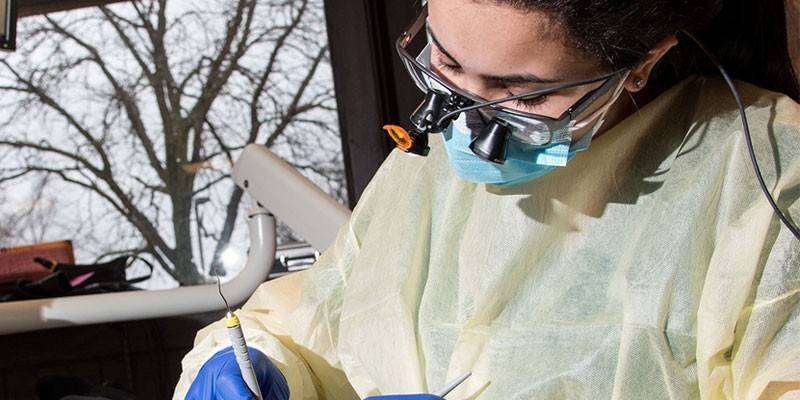This year, the Dental Hygiene Program at Parkland College turns 50. The program has become well known to the community through their dental hygiene clinic, where community members can get exams, cleanings, and x-rays for just $10. The clinic also has an annual Give Kids a Smile Day, where kids ages one through 17 can receive free dental services. I reached out to program director (and alum) Peg Boyce to find out more about the well-established program.
Smile Politely: Can you tell me a little about your background? How you came to be the program director?
Peg Boyce: I am a proud graduate of the Parkland College Dental Hygiene Program. I graduated in 1980 and worked in private practice for Dr. Russell Pitch in Paxton for 26 years. I loved private practice but after 11 years I found myself thinking about teaching. My instructors, who became friends and mentors, encouraged me and gave me the opportunity to teach in clinic on Fridays, while continuing to work in private practice two days a week. I worked in practice and at Parkland for 16 years, eventually teaching a class, and going back to school to earn a Bachelor and Master’s degree. When the position of Director became available in 2006, I applied and was fortunate to be named Co-Director.
SP: This program began not long after the founding of the college as a whole. Can you speak to it’s beginnings? Why was this program introduced at Parkland?
Boyce: Dr. Robert Cross and Dr. Stan Cross, who were brothers, encouraged the college to consider Dental Hygiene as a program. When the college opened the program 50 years ago the campus was in downtown Champaign buildings. The initial dental clinic was there as well until they built the clinic at the Parkland campus. We are still in the same clinic at Parkland but we have had several updates of dental chairs and equipment over the years. The college administration has been very supportive of our program throughout the years.
SP: How has the program changed and evolved since your time as a student?
Boyce: There are always changes that must occur in both healthcare and education. When I was a student we did not wear masks, gloves, sterilize every instrument, or put barriers on items that are touched in the office. In the early 80’s that changed. Now we cannot imagine practicing without gloves, masks, and proper sterilization. We’ve also had to make changes using technology. We have computers at every dental unit, we take only digital x-rays, and our paper charts have been replaced with electronic health records. We have also changed the way we educate students. Our students have requirements that use online learning, and with COVID-19 we have, like most colleges, had to complete this semester’s lecture courses online. We also require our students to rotate through the SmileHealthy Dental Center located at Promise Healthcare. Public health and community service are a strong focus of our program.
SP: Many people in the community know about the dental clinic. When did the program start offering that service? At what point in the program do students become involved in the clinic?
Boyce: Patient care is an essential part of the dental hygiene program. Our clinic has 17 dental chairs/units and our students begin treating public patients the second semester of the program. The first semester they learn infection control, how to manage emergencies and instrumentation by practicing on each other. After being deemed competent by instructors, they begin treating public patients, who make appointments in our clinic. All treatment; exams, x-rays, dental cleaning, and fluoride therapy is $10, which is a huge benefit to patients who do not have dental insurance or are not able to access dental care. Students are held to a very high standard of care of patient treatment, supervised by licensed dental hygiene faculty and a clinical dentist. Appointments in our clinic are three and a half hours long because student must be checked at certain points in treatment, they must complete much more paperwork than in private practice and they are learning.
SP: How long is the program, and what types of classes to students take as part of the curriculum?
Boyce: The program is two years in length with a mandatory summer semester between the two years. Most students take a year of Gen Ed’s and science courses before they begin the program and this allows them to focus on their dental hygiene courses. To graduate and become licensed dental hygiene students must graduate from an accredited dental hygiene program. We have been accredited for 50 years. They must then take the National Board Exam and also complete a clinical exam. Some examples of courses required include Anatomy and Physiology, Microbiology, English, Sociology, Speech, Psychology, Head and Neck Anatomy, Pharmacology, Oral Pathology, Periodontology, Community Dental Health, Ethics, Nutrition, Radiology, Local Anesthesia, and a clinical course each semester.
SP: What’s the job field like for hygienists?
Boyce: The job market has been good for dental hygienists. From the Bureau of Labor Statistics:
“Employment of dental hygienists is projected to grow 11 percent from 2018 to 2028, much faster than the average for all occupations. The demand for dental services will increase as the population ages and as research continues to link oral health to overall health.”
You can find out more about Parkland’s Dental Hygiene Program here.








